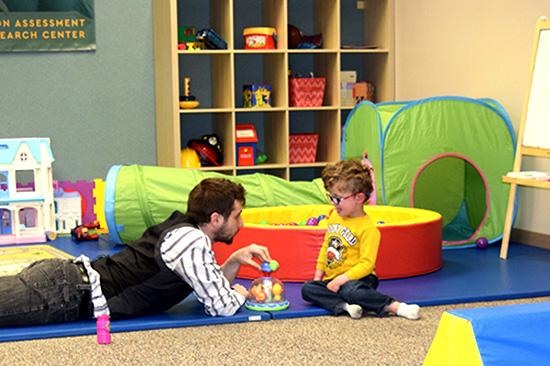A new instructional facility at NMU is offering free clinical services for families throughout the region affected by autism related disorders.
The Behavior Education Assessment and Research Center (BEAR) offers free consultations and specializes in applied behavior analysis, which is recognized by the Center for Autism and Related Disorders as the safest approach to therapeutically preventing behaviors in children with autism. The site also serves as a training ground for students pursuing a degree or certification in applied behavior analysis (ABA).
Currently, the center serves over 20 families throughout the region with enough specialists to handle 30 cases, but there will be a higher capacity once more students enroll in practicum courses at the facility, said NMU assistant professor of psychology Jacob Daar.
Daar is also the coordinator of the ABA master’s program in the psychology department as well as the clinical director of the BEAR facility.
Students working at the clinic are “behavior technicians,” who are mostly undergraduate students primarily focusing on behavioral assessment and comprehensive behavior programming while students working in master programs have a heavier emphasis on analysis, consultation and supervising other staff training, Daar said.
“At the graduate level students are trained in more administrative roles and more complex cases,” psychology instructor and BEAR facility supervisor Jeremy
Biesbrouck said.
Biesbrouck and Daar are two of roughly a dozen certified behavior analysts in the Upper Peninsula, yet there are over 400 children in the U.P. with a diagnosis on the autism spectrum. Daar said only 11 of the analysts are credentialed ABA practitioners but not all of them deal with autism cases, so there is a regional shortage of
services.
Master’s students who complete specialized course requirements as well as one year of supervised clinical experience at the BEAR center are eligible to become board certified behavior analysts. At the facility, they will take on the role of clinical director and oversee other behavior technicians with lesser experience, Daar said.
There are two programs designed for delivering ABA services depending on the need of the client. One is an early-intensive language learning program designed to help pre-school aged children develop language learning skills and basic school readiness through weekly one-on-one therapy sessions. The other offering is a focused behavior program that is designed to assist parents in preventing problematic behaviors in their children like aggression, defiance and self-injury. The age criteria for children is between 2 and 16 years of age for cases.
“It’s not like you come in, you say, ‘I have autism,’ and we say, ‘OK. Here’s the autism plan.’ It’s very individualized and very focused on ‘What does this individual do, and what is this individual’s specific needs?”
Luke Whitehouse, who is pursuing a master’s in applied behavior analysis, is one of the behavior technicians at the BEAR center. Whitehouse is required to work a total of 750 hours at the intensive level of 30 hours per week in order to get ABA certification. In those hours, Whitehouse is supervised by an already certified ABA practitioner as he interacts with children at the center.
“Behavior analysis is the most scientifically rigorous form of psychology that can provide the best services for individuals on the autism spectrum,” Whitehouse said. “We really need those psychological services and having those services available to these young’uns in our local community is so important for their future
development.”
The BEAR Center opened at the end of May and is located in the Public Services Building. The center can be reached at
906-227-2995 or [email protected].





























